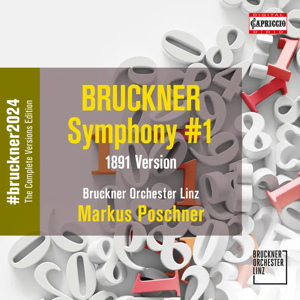
Anton Bruckner (1824-1896)
Symphony No 1 in C Minor (Second version 1891 ed. Brosche)
Scherzo (1865)
Bruckner Orchester Linz/Markus Poschner
rec. live, 7-9 February 2023 (symphony); 8 January 2024 (Scherzo), Rehearsal Hall, Musiktheater, Linz, Austria
Capriccio C8094 [52]
My preferred recording of this later version of Bruckner’s First Symphony has for some years now been the live recording by Gerd Schaller in Bad Kissingen. I refer you to my review for background information. Although Bruckner pronounced himself satisfied with his revisions and many would maintain that we should respect his final thoughts as definitive, the earlier, so-called “Linz” version is still the more popular; nonetheless, there is a case to be made for this “final word” even if it is susceptible to the accusation of being overworked and lacking the spontaneity of the original.
The respective timings for Schaller’s and Poschner’s recordings are similar except the latter is typically two minutes faster in the first movement; his trademark approach, for good or ill, is briskness. The menacing trudge and monitory fanfare with which Schaller’s account opens becomes a much faster advancing march in Poschner’s version and I think it loses something of its impact executed thus; nor is the sound as rich, full and forward as Schaller’s. To complete a trio of observations all in Schaller’s favour, with Poschner, the lyrical second subject is not as strongly contrasted with what precedes it and something has gone wrong with the very quiet phrase beginning 3:46, which stutters and is almost inaudible – rather odd. Although I have previously been impressed with the Bruckner Orchester Linz, they do not make as imposing a sound as Schaller’s Philharmonia, recruited from the best bands in Munich. As such, in comparison, Poschner’s first movement cannot be accounted a success.
The Adagio goes better with some lovely, delicate arpeggiated playing, but again, I think Schaller’s phrasing delivers considerably more depth and gravitas, noticeably at the first climax (which in both recordings occurs at exactly the same juncture of 3:18) and in Bruckner’s more densely scored revision of the conclusion to the movement – and Schaller’s coda is the more serene, owing to the sonority of his orchestra.
Poschner’s Scherzo opens with a kind of erratic, nervy breathlessness which underplays the obsessive, pounding nature of its rhythm – I do not like his manner with it at all. The abrupt transition to the gentle Trio – no flourish in this revision to link the sections – thus results in a more vivid juxtaposition and as with the ending to the Adagio, Schaller confers greater bucolic tranquillity upon the Trio. Yet again, in the opening of the finale, Poschner clips, pushes and rushes the pulse, presumably with the aim of generating more tension, but once more the effect is more one of undue haste than welcome propulsion. It is a difficult movement to keep together, being somewhat spasmodic in inspiration but I enjoy the way Poschner builds throughout the last six minutes to the big C major climax.
The bonus here is the inclusion of the original Scherzo which was replaced in 1866 by the one with which we are more familiar today, perhaps because Bruckner’s fellow musicians von Bülow and Wagner had criticised the first version as too retrospective in style. It is interesting but its replacement is definitely more arresting in its outer sections and its Trio is less distinctive; Bruckner was right to jettison it.
The booklet is, as always in this series, replete with full and informative notes in German and English but is in fact a bit too fat to slide comfortably in and out of the retaining plastic lugs without catching and tearing – irritating, as is the disposable cardboard slipcase.
I am quite clear that when I want to hear this still neglected work, it is to Schaller’s version that I will turn rather than this somewhat mannered account; its flaws are the same which have marred several issues in this series.
Ralph Moore
Buying this recording via a link below generates revenue for MWI, which helps the site remain free.




















